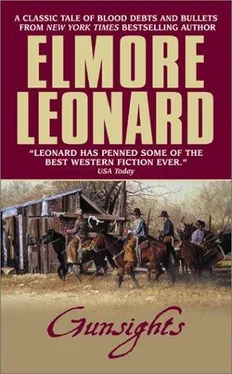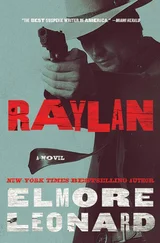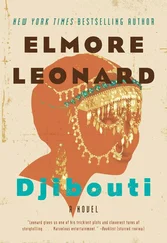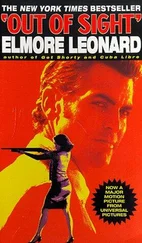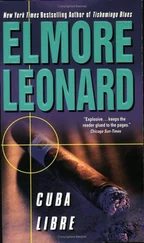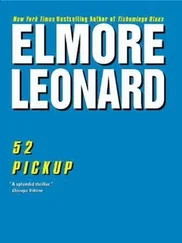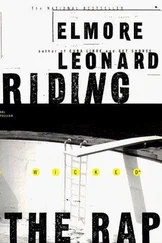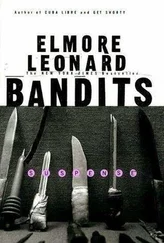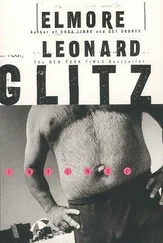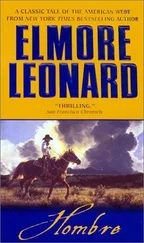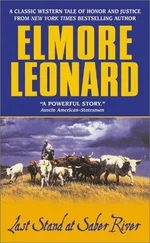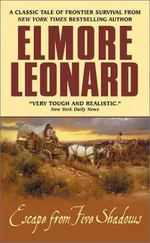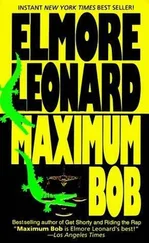Because his luck or intuition had been so keen lately, Maurice Dumas believed him, patting his pocket to make sure he had a pad and pencil. It looked like another Chicago Times exclusive coming up.
About three miles out of town, having come around a bend in the road that was banked close to a steep slope-with still a mile or so to go before reaching the J-L-Bar ranch-they saw something white hanging from a telegraph pole.
Was it a flag of some kind? There was no wind stirring it. As they approached, seeing it straight down the road now, maybe a hundred yards away, Maurice Dumas thought of a bag of laundry. Or, could it be a mail bag out by the Freels place? Something white-as they drew closer-tied to the pole about ten feet off the ground…No, not tied to the pole, hanging from a rope…Not a bag of laundry either. A man. Maurice Dumas heard the Mexican say something in Spanish. He heard C.S. Fly say, “Oh, my God.”
It was Armando Duro, hung there by the neck, the rope reaching up and over the crossbar where the wires were attached and down to the base of the pole where the rope was lashed securely. Armando's head hung down, chin on his chest, his face so dark he looked like a Negro-which was why Maurice was not sure at first who it was. His hands were so much lighter in color, and his bare feet hanging there, toes pointing toward the ground. It looked as though someone had taken his boots.
Maurice heard Ruben Vega saying, “He told me, he said they'd bring him to the ranch,” the Mexican not protesting but speaking very quietly. “He said they'd hold him there and take a picture, see, to prove he was being held and was unharmed.”
C.S. Fly was busy setting up his camera in the road, tilting the box upward, then getting down behind it to look, then adjusting it a little more. C.S. Fly didn't say a word.
“That's what he told me,” Ruben Vega said. “They would hold him there and threaten to kill him, yes, if his people didn't move away somewhere else. But he never said he would do this. Never.”
Was he telling them something or talking to himself?, Maurice Dumas wondered.
Yes, it sounded more like he was trying to convince himself.
Was it an act, though, for their benefit?
No-listening to the Mexican's tone more than the actual words, Maurice Dumas believed the man was honestly surprised and telling the truth.
The news reporters hanging around the Congress Hotel and the Gold Dollar woke up in a hurry.
A man had been lynched in the middle of the afternoon and that goddamn kid from the Chicago Times had scooped them again. (The squirt was even wearing his cap cocked over more on the side of his head.)
Things were happening. C.S. Fly developed three pictures of Armando hanging from the pole like a sack of dirty laundry, made a “showing” of them in his gallery window, marched off to the telegraph office and wired Sheriff John Slaughter in Tombstone; notice, bypassing Deputy R.J. Bruckner.
Why? Because Bruckner was a company stooge and John Slaughter and C.S. Fly were friends, the newsmen speculated. Also to show the mine company that if he, Fly, ran for sheriff of Cochise County next year he was not going to place himself in the company's pocket.
Good stuff was developing. A lot of angles.
Item: Sweetmary was a company town. Without LaSalle Mining there would be no Sweetmary. Therefore the people of Sweetmary and its law enforcement agency would never testify against the company or do anything to put the company in legal jeopardy.
Item: John Slaughter wanted to serve out his term and return to ranching. It was said he was more than willing to use his political weight to help Fly get the Republican nomination. John Slaughter was not a company ass kisser, but he had been in office long enough to have become a realist. Since he was getting out anyway, what did he care what happened here in Sweetmary?
The reporters weren't finished writing that one when John Slaughter arrived in town with a gripsack full of warrants and subpoenas and informed the press that a circuit court judge and county attorney were on their way.
Theory: He was going through the motions to show his friend C.S. Fly the facts of life, liberty and the pursuit of justice in a mine company town.
Well, at least they were making a pretty good show of it.
Item: A warrant was issued for the arrest of Phil Sundeen (not even in town a week) and a Mexican by the name of Ruben Vega (Who?). Sundeen was served, arrested and escorted to jail without incident.
Vandozen, the company vice president, was seen in town for a few hours, then was gone-off in a closed carriage to Benson and the Southern Pacific Railroad depot. But a lawyer who had arrived from Bisbee remained. That same day Sundeen posted a five-hundred-dollar bond and was released. The Mexican, Ruben Vega, could not be located.
Items:
C.S. Fly and the squirt from the Chicago Times, Maurice Dumas, were subpoenaed as witnesses.
Eladio Duro, Armando's son, appeared in town out of nowhere, riding a burro, and was taken into “protective custody” by John Slaughter.
Bruckner wandered around town and up to the mine works with sixteen John Doe warrants for the arrest of the members of Sundeen's security force. He returned with the same number of warrants saying they were nowhere to be found and that they had been discharged from the company payroll.
Bruckner did bring in four dead men, their Sunday suits tearing at the seams, their bodies were so swollen. Three had come from Armando's yard, another from not far away. But only two were identified from personal effects: a man named Wade Miller from Illinois and a man named Harry Shell from Kentucky. Holding his nose as he looked at the other two, Phil Sundeen said no, he did not know their names or was even sure now, because of their bloated condition, he had ever seen them before.
The reporters wanted to know: Well, why the hell didn't they ask Sundeen where the rest of his men were?
John Slaughter said he did, and Sundeen had answered: “Who, them? They did not like horseback riding and quit.”
Well, did he try to get the truth out of Sundeen?
“You mean by the use of physical force?” John Slaughter asked the reporters. “That is not allowed in the interrogation of suspects. At least not in this county.”
But had he used force or not?
Maurice Dumas wrapped a five-dollar bill around a bottle of Green River and put it on R.J. Bruckner's desk as he sat down in the deputy's office. Bruckner did not leave it there more than a moment, getting it into a drawer as Maurice was saying, “Civil servants, I've found, work hard and get little appreciation for their efforts.”
“What do you want?” asked Bruckner.
“Haven't you used force on Sundeen to make him talk?”
“Make him talk about what?”
“Where his men are.”
“What men? Who saw him with any men?”
“I did,” Maurice said.
“Who saw him or any men out where the Mex was found?”
“I saw them here in town.”
“So what did you see? Nothing. Get your smart-aleck ass out of here, sonny.”
“Who else have you got as a witness,” Maurice said, showing his tenacity, “besides Armando's son. Any of the other Mexicans?”
“What Mexicans?”
“Armando's people-the ones that live up there.”
“They're gone,” Bruckner said, “disappeared. It's you and Fly and the Mex's kid…and the Indin agent, Moon.”
This surprised Maurice. “You subpoenaed Moon? How come?”
“We believe he saw things.”
“Sundeen told you that?”
“We know, that's all.”
“Has he come to town?”
“He had better be here tomorrow for the hearing. He's not, I'll go and get him. I may be going for him later on anyway.”
Читать дальше
